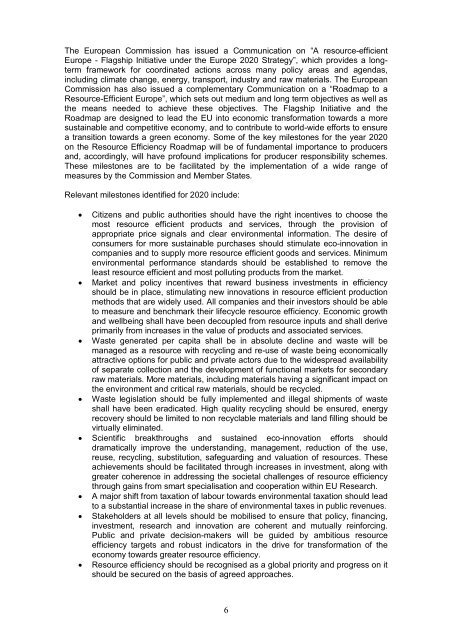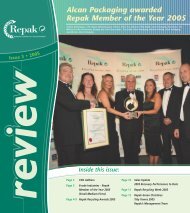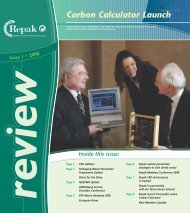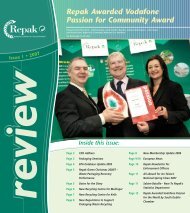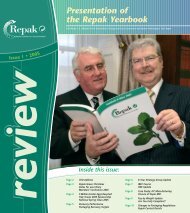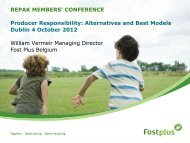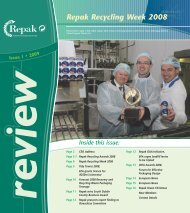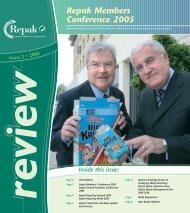Review Of The Producer Responsibility Initiative Model In ... - Repak
Review Of The Producer Responsibility Initiative Model In ... - Repak
Review Of The Producer Responsibility Initiative Model In ... - Repak
Create successful ePaper yourself
Turn your PDF publications into a flip-book with our unique Google optimized e-Paper software.
<strong>The</strong> European Commission has issued a Communication on “A resource-efficient<br />
Europe - Flagship <strong><strong>In</strong>itiative</strong> under the Europe 2020 Strategy”, which provides a longterm<br />
framework for coordinated actions across many policy areas and agendas,<br />
including climate change, energy, transport, industry and raw materials. <strong>The</strong> European<br />
Commission has also issued a complementary Communication on a “Roadmap to a<br />
Resource-Efficient Europe”, which sets out medium and long term objectives as well as<br />
the means needed to achieve these objectives. <strong>The</strong> Flagship <strong><strong>In</strong>itiative</strong> and the<br />
Roadmap are designed to lead the EU into economic transformation towards a more<br />
sustainable and competitive economy, and to contribute to world-wide efforts to ensure<br />
a transition towards a green economy. Some of the key milestones for the year 2020<br />
on the Resource Efficiency Roadmap will be of fundamental importance to producers<br />
and, accordingly, will have profound implications for producer responsibility schemes.<br />
<strong>The</strong>se milestones are to be facilitated by the implementation of a wide range of<br />
measures by the Commission and Member States.<br />
Relevant milestones identified for 2020 include:<br />
<br />
<br />
<br />
<br />
Citizens and public authorities should have the right incentives to choose the<br />
most resource efficient products and services, through the provision of<br />
appropriate price signals and clear environmental information. <strong>The</strong> desire of<br />
consumers for more sustainable purchases should stimulate eco-innovation in<br />
companies and to supply more resource efficient goods and services. Minimum<br />
environmental performance standards should be established to remove the<br />
least resource efficient and most polluting products from the market.<br />
Market and policy incentives that reward business investments in efficiency<br />
should be in place, stimulating new innovations in resource efficient production<br />
methods that are widely used. All companies and their investors should be able<br />
to measure and benchmark their lifecycle resource efficiency. Economic growth<br />
and wellbeing shall have been decoupled from resource inputs and shall derive<br />
primarily from increases in the value of products and associated services.<br />
Waste generated per capita shall be in absolute decline and waste will be<br />
managed as a resource with recycling and re-use of waste being economically<br />
attractive options for public and private actors due to the widespread availability<br />
of separate collection and the development of functional markets for secondary<br />
raw materials. More materials, including materials having a significant impact on<br />
the environment and critical raw materials, should be recycled.<br />
Waste legislation should be fully implemented and illegal shipments of waste<br />
shall have been eradicated. High quality recycling should be ensured, energy<br />
recovery should be limited to non recyclable materials and land filling should be<br />
virtually eliminated.<br />
Scientific breakthroughs and sustained eco-innovation efforts should<br />
dramatically improve the understanding, management, reduction of the use,<br />
reuse, recycling, substitution, safeguarding and valuation of resources. <strong>The</strong>se<br />
achievements should be facilitated through increases in investment, along with<br />
greater coherence in addressing the societal challenges of resource efficiency<br />
through gains from smart specialisation and cooperation within EU Research.<br />
<br />
<br />
<br />
A major shift from taxation of labour towards environmental taxation should lead<br />
to a substantial increase in the share of environmental taxes in public revenues.<br />
Stakeholders at all levels should be mobilised to ensure that policy, financing,<br />
investment, research and innovation are coherent and mutually reinforcing.<br />
Public and private decision-makers will be guided by ambitious resource<br />
efficiency targets and robust indicators in the drive for transformation of the<br />
economy towards greater resource efficiency.<br />
Resource efficiency should be recognised as a global priority and progress on it<br />
should be secured on the basis of agreed approaches.<br />
6


